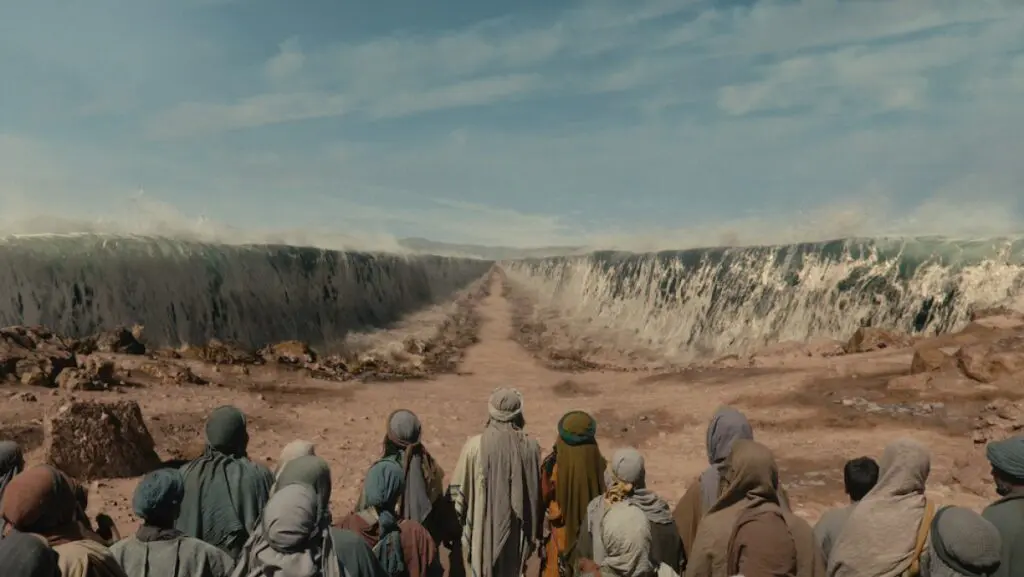Summary
Testament: The Story of Moses is a little confused about what it wants to be, but it’s suited to a very specific demographic who want to hear the same story retold in a new and frictionless way.
Halfway between a supernatural drama and a dry religious seminar, Testament: The Story of Moses squats rather awkwardly in the Netflix thumbnails. Its three episodes are, according to a title card, intended to “enrich the narrative … not be understood as consensus,” which is perhaps just as well. The docuseries makes a point of reconstructing Moses’s life with balanced input from all three Abrahamic religions – Christianity, Judaism, and Islam – and ends up telling the blandest and most anodyne version of an already well-known story.
There is, I think, a word for retelling Biblical stories without nuance, new perspectives, or attempts to challenge the underpinning ideas, and that word is proselytizing. As if the image of Moses wasn’t culturally ubiquitous enough – he’s a prophet in all three of the above religions, in slightly different contexts – here he has been sanded down to a flat everyman projection in whom we can all, supposedly, see ourselves. It never bothers to ask if we’d want to.
Old Story, New Format
What director and co-writer Benjamin Ross might have been thinking is that streaming on Netflix, with all the trappings of a mid-budget limited series, is the best way of getting the story out to a new generation. I’m reminded that Shakespeare is mandatorily taught in every English school and that the worst way of understanding the Bard’s brilliance is to read his plays as a 14-year-old. Testament is the equivalent of showing a rambunctious working-class English Literature class Baz Luhrmann’s Romeo + Juliet instead of making them read the original.
One suspects this is also why the docuseries elects for a hybrid approach, mixing up the usual talking-head interviews with dramatic recreations full of passable plagues and miracles, sprung to life via digital effects. And this isn’t tokenistic gimmickry either – about half of the entire production is this, stewarded rather capably by Avi Azulay in the titular role and imperiously narrated by Charles Dance.
The three episodes – “The Prophet”, “The Plagues”, and “The Promised Land”, winning no points for originality – account for Moses’s entire life, from his birth as a prince of Egypt to his exile and eventual return, through the business with the Hebrews and various holy calamities, across the Red Sea and up and down Mount Sinai. It’s the usual story mapped across Netflix’s play-next-episode template, with all the usual pomp of a narrative series intermingled with deliberately polite and uncontroversial commentary.
Who is this format for? Anyone expecting a rollicking Biblical epic isn’t going to be best pleased with various rabbis and imams popping in for a chat, and anyone looking for genuine scholarly insight won’t get that either. The discussion is deliberately careful about not upsetting anyone, which it no doubt will anyway since very religious people are known to like an argument, but one can hardly say it’s for the right reasons.
Controversy Sells
Speaking of which, that tendency to bicker is probably why faith-based film and TV is so popular; it’s probably why by attempting to be entirely uncontroversial, Testament will annoy people. Netflix, the same company that happily released a “documentary” about Queen Cleopatra that revolved around an obviously controversial and ahistorical claim, knows this. Thus, there’s a whiff of insincerity to the whole thing, both as a drama and a bit of well-intentioned educational programming.
But there’s also the simpler truth. If there’s one thing really pious people like even more than arguing, it’s being told the same story again and again. Testament: The Story of Moses is, perhaps unsurprisingly given the title, the story of Moses, the usual one, albeit with some progressive embellishments that all the talking heads eagerly draw attention to. The anti-PC crowd – who also tend to be religious, lest we forget – will hate that, and, say it with me now, Netflix very much knows this.
What to do, then? A recommendation would be too strong, but a caution against going near Testament would be a bit silly too. It’s best-suited to those familiar with the story who want to hear it again, or those who aren’t familiar with the story but are young enough to put up with the manner in which it’s presented. That’s a narrow demographic, but if they manage to find their way here, all power to them.




